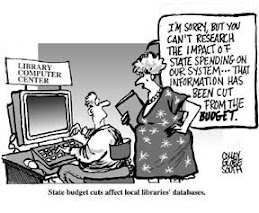Sunday, December 6, 2009
Circulation Situation
Tuesday, December 1, 2009
Library Crisis in the News
Visit msnbc.com for breaking news, world news, and news about the economy
On June 11th, The Today Show did a segment called "Beyond Books: Libraries Lend a Hand in Recession." This video does a good job in summing up all the difficulties faced by libraries, from budget cuts to helping patrons find jobs and use the internet.
If video does not load, visit http://today.msnbc.msn.com/id/26184891/vp/31237988#31237988
A Library's Open System to Dealing with its Budget

Canton - not just home to IKEA, they also have quite a noteworthy public library.
Like any other city, Canton has seen its ups and downs during these tough economic times. For instance, take a look at the Budget,
2008 Budget: $6.4 Million

2009 Budget: $ 5.8 Million
2010 Budget: $ 5.2 Million
Notice a trend?
It does not take a mathematician to see that the past two years has led to more than $1.2 Million in budget cuts. At the same time, library usage is up 25% since 2007.The library knew it was going to have to cut the budget for 2010, so it did the unthinkable – in June the library Director, Eva M. Davis, posted an article explaining the situation and made an open forum where library patrons could voice their say about what should be cut or preserved. Davis responded to each post,
and the amount of participants was surprising - over 40 responses in two weeks!

By September, big decisions and budget cuts arrived. The library preserved its ability to stay open 7 days a week, with 72 hours of operation total. Reasons are listed for why the cuts were necessary and ranged from fewer property tax dollars (94% of the budget), to reducing the library millage rate from 1.5437 to 1.4980 - cutting taxes by $6 for every $100,000 in taxable value (millage rate is the amount per $1,ooo that is used to calculate taxes on property). There also still is fear of what will happen with the statewide revenue and its funding of MeL Cat, which affect statewide Databases and Interlibrary loans.
This library does not hide its facts, instead it forewarns patrons of things to come: longer lines, less staff, longer waits for books on hold, waiting on upgrade computers, less programs for computer classes & story time…the list for this library (like many others) continues.

PDF of 2010 Budget
Images from Flickr
Tuesday, November 24, 2009
GDP and Libraries
This video is a recording of Bobby Kennedy giving a speech about GDP from 1968. He goes into detail about all of the misleading things that are taken into account in calculating GDP. He then goes on to share that those things that aren’t taken into account are what actually makes our country so great. He concludes that GDP encompasses many things that make up the U.S. economy but it cannot tell us what it is to be an American. I decided to take this idea and apply it to the realm of the library and how poorly we measure its success in terms of GDP.
Friday, November 20, 2009
Some Good News!
However, we must remain realistic as well. I realize that most cities right now do not have $37 million to give to a library. I just think that city councils should think twice about cutting library budgets. Instead, maybe city councils could attempt to keep library budgets the same or even provide some extra funding if possible. This may be wishful thinking, but the city of Madison gives me hope!
Wednesday, November 18, 2009
We're all in it together!
Interview with Dr. Camila Alire: http://www.collaborativelibrarianship.org/index.php/jocl/article/view/5
Wednesday, November 11, 2009
Are Celebrities the Answer?

Drew Carey, after winning half a million on the Celebrity Edition of “Who Wants to be a Millionaire,” donated the money to a cause of his choice – the library! This happened in Ohio nine years ago, and is still being brought up in The Cleveland Leader. This rare happening was paired with his opinion on the Governors new plan to cut the library’s budget in half. His answer to this new ordeal – a fundraising carwash! Still, his playful solution is only a hypothetical answer.
Luckily, after much rallying and teamwork, the resulting budget cut in Ohio was not as drastic as Governor Ted Strickland proposed, with a reduction of “$84.3 million over the next two years, rather than the $227.3 million.” It is believed that the overpowering support of the community is one reason the governor’s cuts were rejected. This goes to show that with enough voices in a community, a library budget can be saved.

One thing I could not help thinking about is the strength of a celebrity’s voice in comparison to a community. A celebrity has the ability to get the attention of more people across the nation, while a community’s voice is usually not heard far beyond city limits. Celebrities have the ability to record public commercials and are used in pro-reading posters. So why not ask celebrities to join in on the community level of fighting to save libraries?
After further research I found a union of celebrities and libraries. In 2006 the U.K. began a campaign to improve libraries; it goes by the name Love Libraries. The campaign consists of “50 celebrity supporters from JK Rowling to the Hairy Bikers,” along with 500 champions, consisting of everyday people. As a Love Library Champion, it is easy to sign up to receive updates and the campaign uses this outlet to ask for consultations from supporters.
Perhaps we can utilize this hybrid idea from across the seas and make a Love Libraries for the United States. Who knows what can happen through the power of many voices.
For Some Free Poster Downloads of Celebrity's Promoting Reading visit: http://www.getcaughtreading.org/celebrityposters.htm




